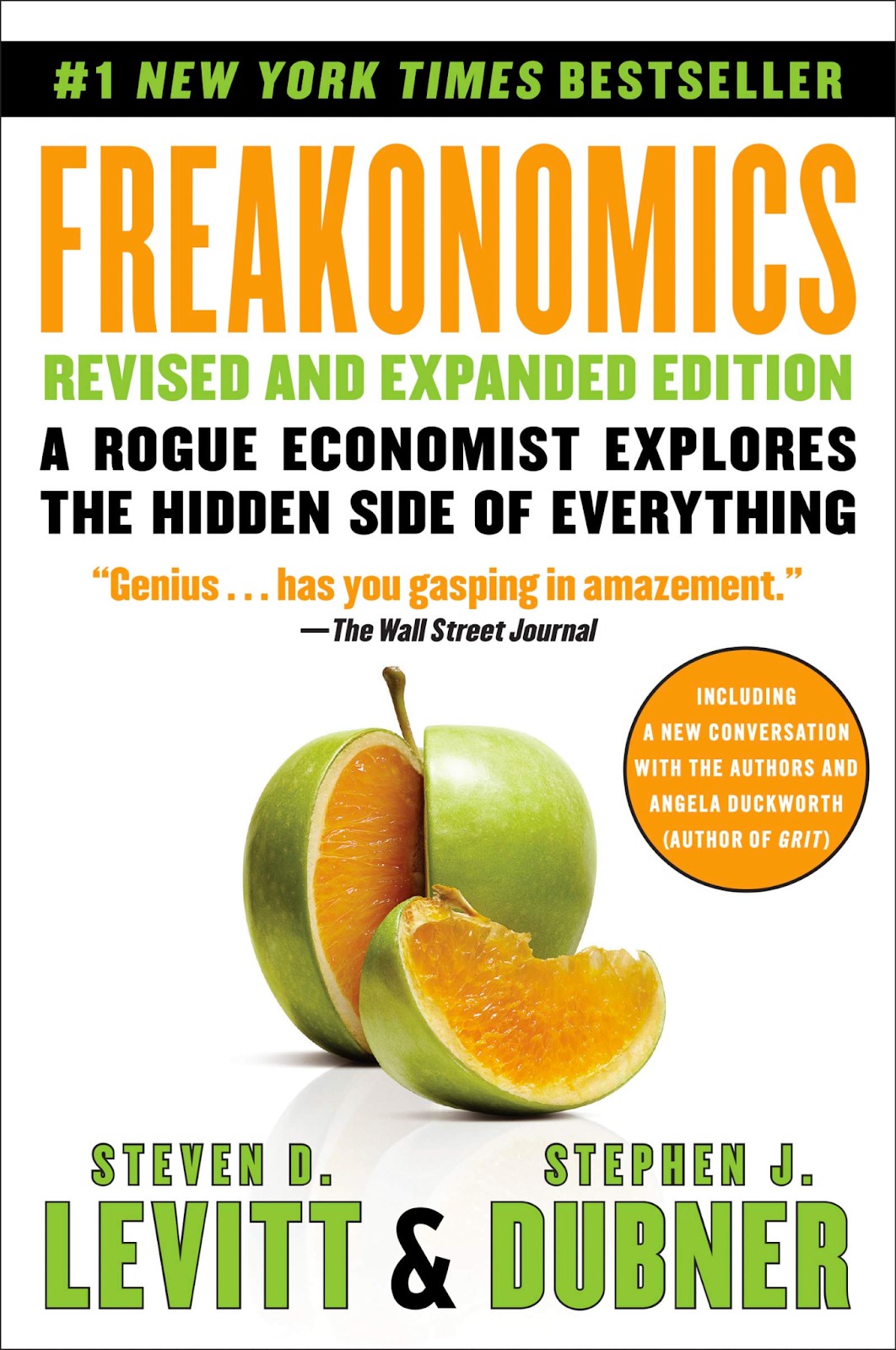Learning economics can seem daunting, but it’s absolutely achievable outside a traditional classroom setting. At LEARNS.EDU.VN, we provide a roadmap to effectively understand economics and develop vital analytical skills. Discover How To Learn Economics through accessible methods, enhance your economic literacy, and apply your knowledge to real-world scenarios. Explore LEARNS.EDU.VN for curated resources, expert insights, and tools to support your economic education journey and unlock the power of financial understanding and critical thinking.
1. Spark Your Interest with Introductory Economics Books
Instead of diving straight into complex theories, start with engaging books that showcase economics’ real-world applications. These reads will make the subject relatable and prepare you for the more technical aspects later. Here are a few suggestions to spark your interest.
1.1 Freakonomics
Freakonomics is a fascinating read that explores the hidden side of everything. Steven Levitt and Stephen Dubner use economic principles to answer intriguing questions, like whether swimming pools or guns are more dangerous and if sumo wrestlers cheat. This book makes economics accessible and entertaining.
1.2 Basic Economics
Thomas Sowell’s Basic Economics provides a clear and jargon-free guide to understanding how the economy works. While Sowell’s perspective leans towards free-market capitalism, the book offers a comprehensive overview suitable for anyone seeking economic insights without complex graphs and equations.
1.3 The Economists’ Hour
This book explores an era when economists wielded significant influence on policy and politicians. It’s a great read for those interested in the intersection of government and economics and offers valuable insights into the history of economic thought.
1.4 Thinking Strategically
Thinking Strategically introduces game theory, a powerful tool in economics, to help you outmaneuver competition in business, politics, and everyday life. The book uses case studies to illustrate strategic thinking principles across various disciplines.
2. Master Micro and Macroeconomics
A solid grounding in microeconomics and macroeconomics is essential. These are the building blocks for understanding more complex economic concepts. Many universities start their economics majors with these subjects.
2.1 Online Courses for Micro and Macroeconomics
Online courses offer structured learning with the flexibility to study at your own pace.
2.1.1 MIT Principles of Economics Course – MIT OpenCourseWare
MIT OpenCourseWare provides comprehensive materials for introductory microeconomics, including lecture recordings, problem sets, and exams. This resource offers a rigorous and trusted foundation in microeconomics.
2.1.2 University of Queensland Macroeconomics Program – edX
The University of Queensland’s program on edX offers a self-paced introduction to macroeconomics. This program covers macroeconomic indicators, policy, and international macroeconomics, providing a well-rounded understanding of the subject.
You can also take the courses separately and for free, like the one in macroeconomics policy:
2.2 Textbook Route for Micro and Macroeconomics
Textbooks offer a detailed and comprehensive approach to learning economics.
2.2.1 Principles of Microeconomics, 7th Edition, by Gregory Mankiw
Mankiw’s Principles of Microeconomics is a student-friendly textbook that covers the fundamentals without overwhelming jargon. It emphasizes real-life applications, making the concepts more engaging and understandable.
2.2.2 Principles of Macroeconomics by OpenStax
OpenStax’s Principles of Macroeconomics provides a clear and affordable introduction to the subject, covering the essential topics taught in introductory macroeconomics courses.
3. Explore the History of Economic Thought
Understanding the evolution of economic ideas can provide valuable context and deepen your appreciation for the field. It also lets you grapple with some of the greatest economic ideas.
3.1 The Worldly Philosophers
The Worldly Philosophers offers an engaging overview of the lives and ideas of influential economists such as Adam Smith, Karl Marx, and John Maynard Keynes. This book contextualizes their theories within their historical and social environments, enhancing your understanding of their significance.
4. Expand Knowledge with Beginner-Level Economics Courses
Taking multiple beginner-level economics courses exposes you to different subdisciplines within economics, from behavioral economics to political economy.
4.1 Course Options
These courses require no math beyond high school level.
4.1.1 Financial Markets
Yale’s free online course provides an overview of the institutions and methods that enable society to create wealth and manage risk.
4.1.2 Introduction to Political Economy
Duke’s lecture series explores the intersection of politics and economics, offering insights into how political factors influence economic policies and outcomes.
4.1.3 History of the U.S. Economy in the 20th Century
This course from The Great Courses examines major economic events and trends in the U.S. throughout the 20th century. You’ll learn about the creation of the Federal Reserve to the stagflation of the 1970s.
4.1.4 From Poverty to Prosperity: Understanding Economic Development
Offered by Oxford via edX, this course explores the factors that drive economic development and reduce poverty in different countries.
4.1.5 Behavioral Economics: An Introductory Course
This Udemy course covers behavioral economics, which combines psychology and economics to understand decision-making.
5. Stay Informed with The Economist
Reading The Economist can help you apply economic concepts to real-world events and stay current on global economic issues and trends.
5.1 Incorporating The Economist Into Your Study
The Economist provides in-depth coverage of economic events, helping you relate what you learn to real-world scenarios. Reading it regularly can make you more informed and enhance your understanding of economic policy.
6. Immerse Yourself in Classic Economics Books
Reading classic economics books exposes you to the foundational ideas that have shaped the field and allows you to engage with the original arguments of influential thinkers.
6.1 Classic Reads
Consider reading these books intermittently as you progress through your studies.
- The Wealth of Nations by Adam Smith
- Das Kapital by Karl Marx
- Capitalism and Freedom by Milton Friedman
- The General Theory of Employment, Interest and Money by John Maynard Keynes
- Capitalism, Socialism, and Democracy by Joseph Schumpeter
7. Reflect on Your Learning Goals
Before diving into more advanced topics, pause to assess your interests and goals. This reflection will help you decide whether to pursue a more mathematical path or focus on specific areas of economics.
7.1 Assessing Your Path
Consider your comfort level with math and your specific interests within economics. If you prefer to avoid heavy mathematical analysis, you can focus on applied fields such as environmental economics or international economics.
8. Advance Your Knowledge with Intermediate Economics
Intermediate microeconomic theory and macroeconomics build on the foundational concepts, requiring a deeper understanding and more sophisticated analytical skills.
8.1 Intermediate Microeconomic Theory
MIT offers course material for intermediate microeconomics, including lectures, readings, and problem sets. This course covers consumer choice, the theory of the firm, and general equilibrium models.
Alternatively, Hal Varian’s Intermediate Microeconomics: A Modern Approach is a classic textbook.
8.2 Intermediate Macroeconomics
For intermediate macroeconomics, Gregory Mankiw’s Macroeconomics is highly recommended. This textbook offers a clear and engaging explanation of complex topics.
9. Explore Advanced Economics Courses
Explore your interests by taking courses or reading books that resonate with you.
9.1 Intermediate Course Options
Browse through MIT’s courses or Udemy for options that strike your fancy.
- International Economics
- Game Theory
- Urban Economics
- Labor Economics
- Public Economics
10. Master Statistics, Probability, & Econometrics
Understanding statistics, probability, and econometrics is crucial for analyzing economic data and testing hypotheses.
10.1 Course Recommendations
- Statistics
- Probability
- Econometrics
11. Stay Curious & Continue Your Economic Education
Having acquired a solid foundation in economics, continue exploring topics that fascinate you and consider how you can apply your knowledge to make an impact.
11.1 Expand Your Horizons
Explore related fields such as political science or data analysis to broaden your understanding.
FAQ: How to Learn Economics
-
Is it possible to learn economics on my own?
- Yes, it is possible with the right resources and a disciplined approach.
-
What are the essential topics to cover?
- Microeconomics, macroeconomics, and the history of economic thought.
-
What are some good introductory books?
- Freakonomics and Basic Economics are great starting points.
-
Are online courses effective for learning economics?
- Yes, platforms like Coursera, edX, and MIT OpenCourseWare offer excellent courses.
-
Do I need a strong math background?
- Basic math skills are helpful, but many introductory resources minimize complex equations.
-
How can I stay updated on current economic issues?
- Reading publications like The Economist can help.
-
What are some key skills I will develop?
- Analytical reasoning, problem-solving, and critical thinking.
-
Where can I find practice problems and exams?
- MIT OpenCourseWare and other university websites often provide these resources.
-
How long does it take to learn economics on my own?
- It depends on your pace and goals, but consistent study over several months can yield significant progress.
-
Can self-learning economics help my career?
- Yes, it can enhance your understanding of financial markets, business strategies, and public policy, which are valuable in many professions.
Unlock Your Economic Potential at LEARNS.EDU.VN
Self-learning economics requires dedication and the right resources. At LEARNS.EDU.VN, we empower you to understand and analyze the world through an economic lens. Whether you’re a student, a professional, or simply curious, LEARNS.EDU.VN is your gateway to unlocking economic insights and skills.
Are you ready to begin your economics journey? Visit LEARNS.EDU.VN today to explore our comprehensive resources, connect with experts, and start building your economic knowledge.
Contact Information:
- Address: 123 Education Way, Learnville, CA 90210, United States
- WhatsApp: +1 555-555-1212
- Website: learns.edu.vn

